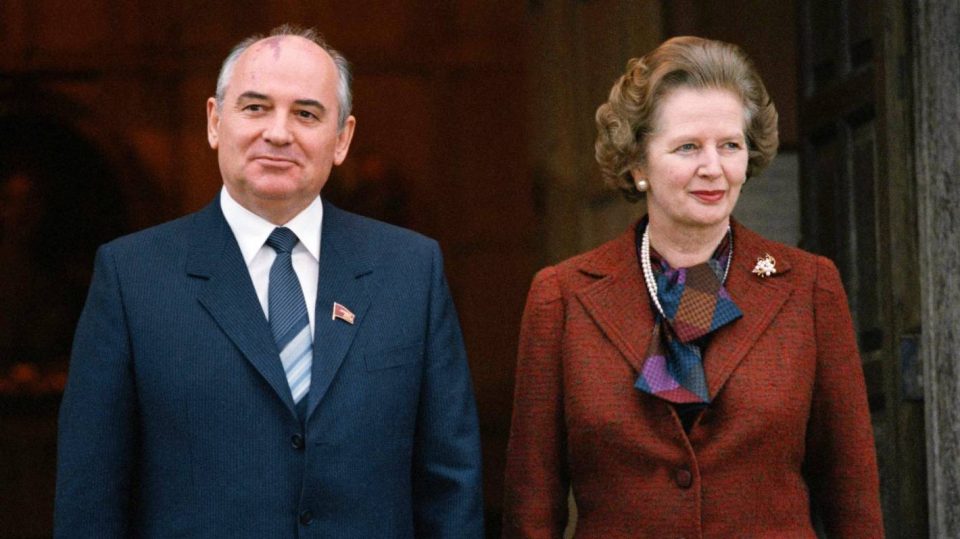Donna Miles is an Iranian-Kiwi columnist and writer based in Christchurch.
OPINION: The recent death of the last leader of the former Soviet Union, Mikhail Gorbachev, caused me to reflect on the low calibre of today’s political class.
Whatever one thinks of the likes of Gorbachev and Margaret Thatcher, it is hard to deny their passion for their ideas and their brilliance in political leadership.
But where are today’s great leaders?
READ MORE:
* Josie Pagani: Liz Truss isn’t the leader the world needs right now
* When the problem for a satirist is that the stuff writes itself
* Sunak v Truss: Finalists in race to replace British PM Boris Johnson revealed
* Blow after blow yet ‘delusional’ Britain’s Boris Johnson vows to survive the unsurvivable
* The National Party opted for predictable Christopher Luxon over changemaker Shane Reti
* Politics by the books
Tony Blair, who won three general elections and led Britain into a war in Iraq (it’s worth remembering that a poll five years ago found a third of Britons wanted to see him tried as a war criminal), has remarked that he would be “really worried” if any of his children, especially his daughter, followed his path into parliamentary politics.
The reason, he explained, was the poisonous political environment created by social media. This is a very telling commentary on our times, which might explain why the pool of political talent is rapidly shrinking.
Today, more than ever, we need inspirational leaders to help solve entrenched political, social and economic problems. What we need is brilliance, not the current mediocrity.
Ultimately, politics is about clear communication and connecting with people emotionally. It helps, therefore, to be driven by deep conviction, because the most effective way of encouraging other people to believe in your ideas is to truly believe in them yourself. Famous world leaders, from Mahatma Gandhi to Martin Luther King, all had an unwavering vision for the future and a clear plan to get there.
Today’s politicians are driven, primarily, by maximising their market share of voters.
Natural charisma and a gift for leadership are as obvious in their absence in someone as they are in their presence. For instance, many people would agree that none of the leaders of the National Party after John Key, including incumbent Christopher Luxon, display the abilities and charisma of a natural leader.
Increasingly, people are coming to politics with long-held ambitions for political power, rather than idealogical passion. The goal of political leadership is no longer to communicate complicated ideas to people, but to achieve electoral success.
Meeting Gorbachev is now available to rent from iTunes, GooglePlay, YouTube, Academy OnDemand, Deluxe AtHome, Roxy OnDemand and AroVision.
Politicians from both sides of the political divide seem to be equally guilty of this. Keir Starmer, the leader of the UK’s Labour Party, made no apologies in a recent interview for focusing on winning the next general election – and shrugged off reneging on his campaign promises, such as nationalisation and tax hikes for the super-wealthy.
These are the policies that got Starmer elected when his main focus was to become the leader of the Labour Party. Now that his focus has shifted to winning the general election, so have his ideas.
Should this be acceptable? I agree with Starmer’s critics who say reneging on election promises undermines people’s confidence in politics and, by extension, the strength of democracy.
Carl Court/Getty Images
UK Labour Party leader Keir Starmer “made no apologies in a recent interview for focusing on winning the next general election”.
Competent political leaders should be able to explain and sell unpopular ideas to their voters. Helen Clark decided to accept 150 Afghan refugees from the MV Tampa, despite the political risk that it might be seen as opening the floodgates to future asylum-seekers. On the Tampa issue, Clark showed real leadership and succeeded in changing hearts and minds. Today, most Kiwis think very positively about the Tampa refugees, and Clark has said her decision was one of her proudest moments as prime minister.
In his famous 1919 Munich lecture, ‘Politics as a Vocation’, Max Weber, the German sociologist and political economist, said political leadership should be about the balance between the ethics of conviction and the ethics of responsibility. It is not good to live and die by your convictions without considering the consequences of those convictions.
Gorbachev, for example, remains a controversial figure, especially inside Russia, because, although his ideas of glasnost (openness) and perestroika (restructuring) lifted the so-called Iron Curtain and ended the Cold War between Russian and the West, they also brought chaos and led to the break-up of the USSR (hence the reference to Gorbachev as the man who lost an empire).
Supplied
Donna Miles: “I agree with Starmer’s critics who say reneging on election promises undermines people’s confidence in politics and, by extension, the strength of democracy.”
Likewise, Thatcher’s steadfast ideologies were responsible for many of today’s economic miseries in Britain. Her unflinching ideas also led to her fall from power.
I was living in Scotland at the time when massive riots were taking place against Thatcher’s poll tax, or “community charge”. The Iron Lady introduced a fixed council tax levied on each adult, to be set by each local council.
Thatcher did not foresee the strength of the opposition and potential for violence. People were not going to pay their taxes, not only because it advantaged people who lived alone in their big mansions, but because they simply couldn’t afford to pay it. The idea was as impractical as it was unfair.
I feel, in New Zealand, we currently have a balanced leadership. But I fear for the future of the West, and to some extent, the future leadership of our own country, because, in the current climate of economic hardships, the absence of effective political leadership can easily unleash violent political forces.


